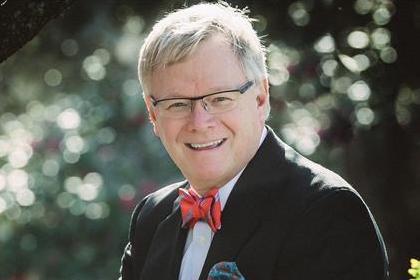Dr Ed Brenegar Believes Leadership Can Start with Building Your Circle Of Impact
Listen Now
In This Episode
How our world works and the expectations of our contributions have shifted greatly over the past few years. We need more problem solvers and people who are ready to adapt to the changing situations we face in business and our personal lives. Dr. Ed Brenegar shares his approach with us in how any can use leadership skills to make valuable impact, a fact he highlights in his book Circle of Impact: Taking Personal Initiative to Ignite Change.
Episode Highlights
3:11 Greg talks about Ed’s bio and how it seems he is looking to encourage people to make personal impacts and his own passions in life.
3:45 Ed introduces his views on impacts people can have in their lives and how it can be from a personal perspective or from a business owners can make. He talks about a leader star culture and a leadership rich culture.
4:50 Dave asks about Ed’s motivation for writing the book, Circle of Impact
5:10 Dr Ed talks about his work as consult that exposed him to various types of locations showed him how there were many people not living up to their potential. He explains that he found this was due to the mindset of the business organization and how it was structure.
6:00 Ed would ask what leaders would see the potential of their employees being and they couldn’t answer that question, that made him realize there is a concern there where people are underperforming because they were in situations where they couldn’t take personal initiative to make impacts that matter.
6:40 When people make that shift, people feel trusted and they have stake in the business and the success.
6:54 Dave asks what Ed thinks it is that stifles that capacity, what barrier exists?
7:14 Ed thinks it is how businesses have developed over the last hundred years and the shift away from smaller businesses and siloed roles.
7:50 Efficiency became a ruling idea for measuring success.
8:05 Our society has shifted where we now need people to be creative and innovative in their roles and think beyond one task.
8:30 The need for individuals to function at their very best is raising to the top of what our business need now.
8:50 Dave agrees that the explanation of why that shift is occurring and barriers are being hit.
9:14 Dave asks if as Ed starts to work with an organization that it must help with employee retention and engagement.
9:35 Ed agrees that it is true and that in order to get the best talent, an employer needs provide the environment for the talent to meet their goals.
10:06 The more your company is a circle of impact company, the more that people who have leadership skills will want to come work with you.
10:30 Greg asks how Ed feels the market is impacted by the philosophy of creating good work environments
11:09 Ed thinks that there is a culture that is created around a company taking this approach and your employees become your best marketers.
11:36 Ed also says how many of us need to be agile and adaptive and if we equip our employees to be that way, our companies will look that way in the marketplace.
11:55 Ed says we can’t hide how our company environments are any more, it’s all out there.
12:40 Dave asks how Ed assess where a company is and how he supports the shift of a company moving towards
13:01 Ed explains the first step which he learned from his years of consulting is that the person at the top of the pyramid the owner, CEO etc. has to go through a look at themselves to see their role in the company.
13:40 Without change at the top, the rest of the company will not change.
13:57 When the leader decides they want to different than they’ve been, it gives permission for everyone else to be different than they’ve been.
14:23 Particular to Ed’s Circle of Impact model is to teach people how to solve problems in different situations.
15:04 Whatever the situation is you ask yourself, what kind of problem is this?
15:28 When you solve a problem you align the three dimensions of leadership of Ideas, Relationships and Structure.
15:50 You give people the tools to change from within instead of tackling the entire organization at once.
16:00 Greg asks what kind of organization Ed works with.
16:25 Ed says he’s interested in working with organizations that are open to change.
16:53 Another type of business is people who don’t really know why they’re in business.
17:12 Instead of industry, it’s more about the mindset that a company is in. Typically mid-sized companies since they have a lot more freedom and room to change.
17:40 Ed likes working with local governments because they are critical to the success of our society.
18:22 Ed uses the example of speaking with a man at a book signing who wants to do more than being a welder at the company he works for and his struggle with not being allowed to do more in his role.
20:08 Dave says it is surprising that there are companies that would turn down people wanting to do more, but he reflects that he has run into that in his work before.
20:26 Dave enjoys the view of leadership Ed presents of leadership not having to be tied to your role in the organization.
20:49 Dave asks what is Ed’s advice at an individual level to build leadership
21:10 Ed says to take whatever the person’s interest is and look for areas they can make impact, sometimes outside of work at a community level.
21:32 Ed says we are not bound by the institutions we are bound by in the past.
21:48 Learn something that no one is asking you to learn, but you have a desire to learn.
22:01 Dave agrees it should be that simple, but people are prevented from taking that step. What’s the difference between people who find the path or those who seek it out.
22:30 Ed thinks there were people who were raised to take initiative and others who were beat down as children and never got the idea that they have an inherent value to their life by making decisions.
23:11 Ed thinks we have a lot of people in our culture who were never taught to take initiative in their lives.
23:32 Ed asks teachers if they should be teaching 4th graders to build entrepreneurial businesses and many agree we should and he is stating to hear teachers tell him that they are doing that.
24:21 It’s in the experience of failing that you learn the confidence to know you can overcome any situation you are in.
24:56 Ed talks about his connection the organization Random Kids that supports entrepreneurial endeavours for kids and encourages them to pursue their own initiative.
25:36 Dave says wouldn’t it be great if that is the reflex of just seeing how they can do it instead of getting discouraged.
26:25 Dave mentions the idea of coding and value of coding that David Alston taught us about and how that supports the idea of problem solving.
27:09 Greg mentions Brilliant Labs and the Hemmings House documentary Code Kids.
27:36 Ed mentions how that type of work helps him with his speak with parents who want their kids to learn their Circle of Impact.
28:28 Ed explains how to find his book Circle of Impact (https://www.amazon.com/Circle-Impact-Taking-Personal-Initiative/dp/1682617866) and his website. https://edbrenegar.com/

Dr. Ed Brenegar
Dr. Ed Brenegar is the Founder and Chief Initiator of Circle of Impact Leadership. He is the author of Circle of Impact: Taking Personal Initiative To Ignite Change.
He works with individuals, organizations and communities who are in transition to discover and develop plans for creating impact that makes a difference that matters. He brings a fresh, innovative approach to leadership, defining it as, “All leadership begins with personal initiative to create impact that makes a difference that matters.”
Check out The Boiling Point Podcast!
A podcast for the ever evolving entrepreneur.
FOLLOW THE BOILING POINT PODCAST
To subscribe using another podcatcher, copy this URL:
http://feeds.feedburner.com/boilingpointpodcast

